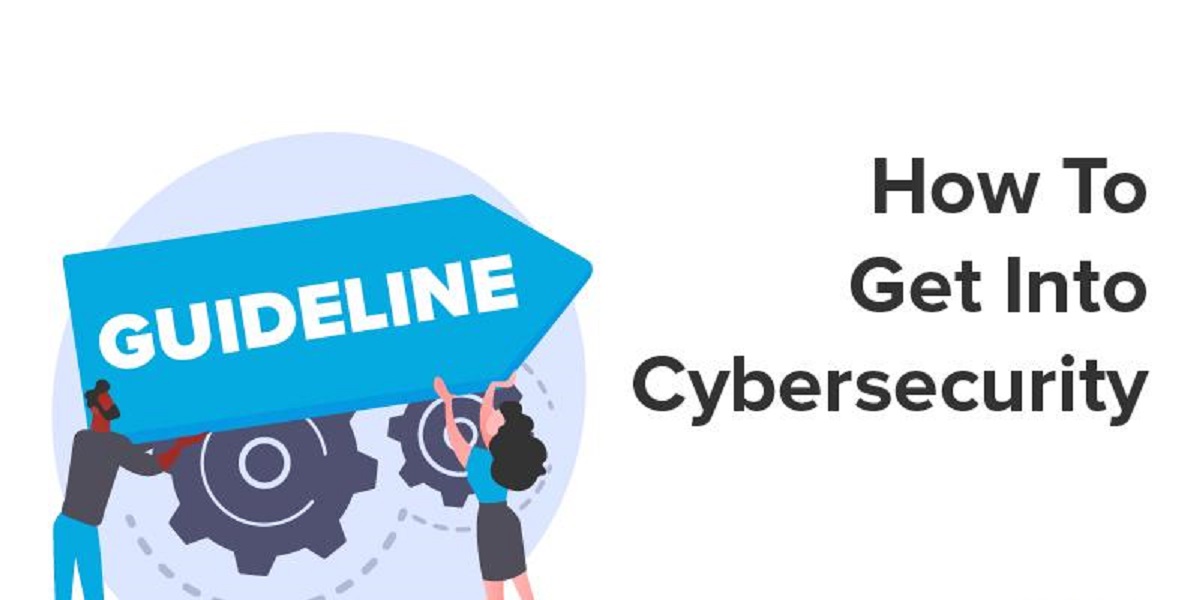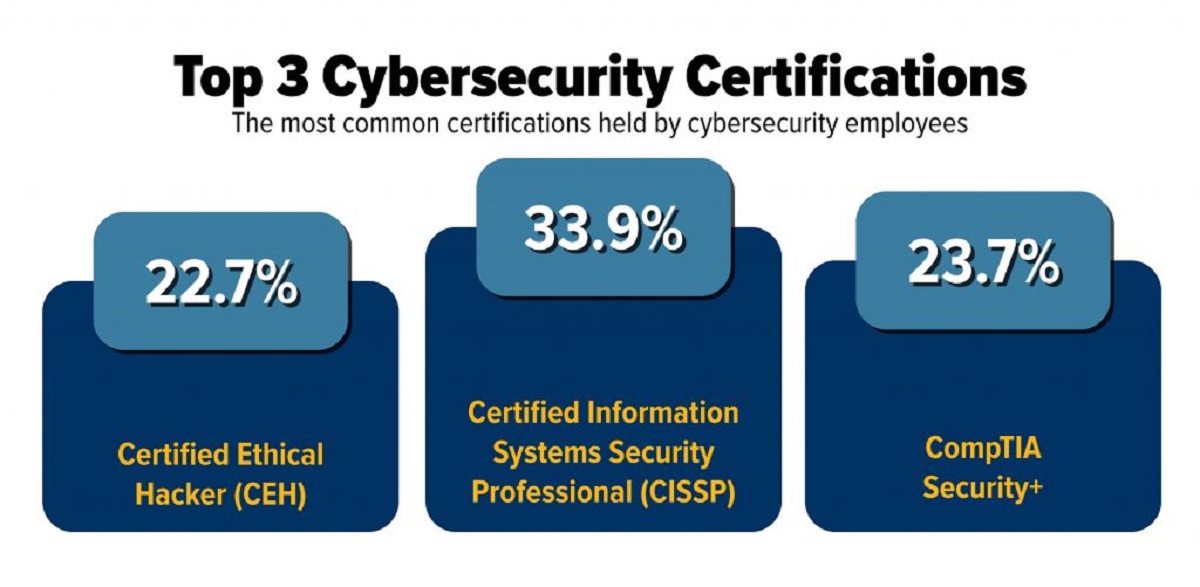Introduction
Starting a cybersecurity internship can be an exciting and rewarding opportunity to gain real-world experience in the fast-paced field of information security. As cybersecurity continues to be a critical aspect of business operations, the demand for skilled professionals in this field is growing rapidly. By preparing effectively for your cybersecurity internship, you can position yourself for success and maximize your learning and growth during this valuable experience.
In this article, we will explore the important steps you need to take to prepare for a cybersecurity internship. From researching potential internship opportunities to enhancing your technical skills and building professional relationships, you’ll discover the strategies that will help you navigate the internship landscape with confidence.
During your cybersecurity internship, you will have the chance to apply the knowledge and skills you have acquired in a practical setting. This hands-on experience is invaluable, as it allows you to tackle real-world cybersecurity challenges and learn from experienced professionals in the industry. Whether you are pursuing an internship with a large corporation, a government agency, or a cybersecurity consulting firm, being well-prepared will set the foundation for a successful internship journey.
Throughout this article, we will provide practical tips and insights to help you make the most of your cybersecurity internship. From understanding the role of a cybersecurity intern to developing the necessary technical and soft skills, you will gain the knowledge and resources to excel in your internship and lay the groundwork for a successful career in cybersecurity.
Understanding the Role of a Cybersecurity Intern
Before embarking on your cybersecurity internship journey, it’s crucial to gain a clear understanding of what the role entails. As a cybersecurity intern, your primary goal is to support the organization’s cybersecurity efforts and gain practical experience in the field. You will have the opportunity to work alongside experienced professionals, contribute to ongoing projects, and learn about the various aspects of cybersecurity.
As an intern, you may be assigned a range of responsibilities, depending on the organization and the specific internship program. This could involve assisting with risk assessments, vulnerability assessments, and penetration testing. You may also be involved in monitoring security systems, analyzing security logs, and responding to security incidents.
In addition to technical tasks, cybersecurity interns are often expected to participate in team meetings, collaborate with colleagues, and contribute to brainstorming sessions. This provides an excellent opportunity to develop your communication, problem-solving, and critical thinking skills. It’s important to note that as an intern, you are there to learn and grow, so don’t hesitate to ask questions and seek guidance from your mentors and colleagues.
Throughout your internship, you will gain exposure to different areas of cybersecurity, such as network security, application security, cloud security, and incident response. This exposure will help you identify and explore your areas of interest within the field and develop a well-rounded skillset. It’s essential to approach your internship with an open mind and a willingness to learn, as this will allow you to make the most of the opportunities presented to you.
By understanding the role of a cybersecurity intern, you can set realistic expectations for your internship experience. This knowledge will help you align your goals, adapt to the organization’s expectations, and be proactive in seeking out valuable learning opportunities. Throughout the article, we will delve into specific strategies and actions you can take to prepare effectively for your cybersecurity internship and make the most of this exciting opportunity.
Researching Potential Internship Opportunities
When preparing for a cybersecurity internship, it’s important to conduct thorough research to identify potential internship opportunities that align with your interests and career goals. Start by exploring reputable job boards, internship portals, and company websites specializing in cybersecurity. These platforms often feature internship listings from a variety of organizations, including corporations, government agencies, and cybersecurity consulting firms.
As you research potential internship opportunities, take note of the qualifications, requirements, and responsibilities outlined in the job descriptions. This will help you understand the specific skills and knowledge that organizations are seeking in their cybersecurity interns. Pay attention to any preferred certifications, such as Certified Information Systems Security Professional (CISSP) or Certified Ethical Hacker (CEH), and consider pursuing these certifications to enhance your chances of landing a coveted internship position.
In addition to job boards and company websites, leverage your professional and academic networks to discover internship opportunities. Reach out to professors, mentors, fellow students, and industry professionals to inquire about potential openings or recommendations. Networking can often lead to hidden opportunities that may not be advertised publicly.
Take the time to research and familiarize yourself with the organizations offering internships. Look into their size, reputation, and the types of clients or industries they serve. This information will give you valuable insights into their culture, values, and areas of expertise. Consider whether their focus aligns with your interests and career goals.
Remember to keep a record of the internship opportunities you find. This can be as simple as creating a spreadsheet with the organization name, position title, application deadline, and any additional notes or requirements. This will help you stay organized throughout the application process and make it easier to track your progress.
By thoroughly researching potential internship opportunities, you can identify the ones that best align with your aspirations and qualifications. This will allow you to tailor your application materials and make a strong case for why you are the ideal candidate for the position. In the next section, we will discuss how to prepare your resume and cover letter to showcase your skills and experience effectively.
Preparing Your Resume and Cover Letter
Your resume and cover letter are essential tools in your cybersecurity internship application. They provide a snapshot of your skills, qualifications, and experiences to potential employers. By crafting a compelling resume and cover letter, you can effectively showcase your abilities and stand out from other applicants.
Start by tailoring your resume to highlight relevant skills and experiences that are applicable to the cybersecurity field. Include any coursework, projects, or certifications you have completed that demonstrate your knowledge of information security concepts and technologies. Emphasize any previous work or volunteer experiences that showcase your attention to detail, problem-solving skills, and ability to work in a team.
When writing your cover letter, make sure to personalize it for each internship opportunity you apply for. Address the specific requirements and responsibilities outlined in the job description and explain how your skills and experiences make you a strong fit for the position. Use concise and compelling language to articulate your passion for cybersecurity and your desire to contribute to the organization’s security efforts.
Both your resume and cover letter should be clear, concise, and error-free. Proofread them carefully to ensure there are no spelling or grammatical mistakes. Keep the formatting clean and professional, using bullet points and headings to make important information stand out.
Additionally, consider including relevant keywords and phrases throughout your resume and cover letter. Many companies use applicant tracking systems (ATS) to screen resumes, and using the right keywords can help your application get noticed. Look for keywords in the job description and ensure that you incorporate them naturally into your application materials.
Finally, always tailor your resume and cover letter to each internship opportunity. Customize them to highlight the skills and experiences that are most relevant to the specific position and company you are applying to. This level of personalization shows your genuine interest and commitment to the role and increases your chances of being selected for an interview.
By diligently preparing your resume and cover letter, you can present yourself as a strong candidate for a cybersecurity internship. In the next section, we will discuss how to enhance your technical skills to excel in your internship and beyond.
Enhancing Your Technical Skills
In the field of cybersecurity, having strong technical skills is crucial. To excel in your cybersecurity internship and future career, it’s essential to continuously enhance your technical abilities. Here are some strategies to help you develop and refine your technical skills in preparation for your internship:
1. Stay Updated: Cybersecurity is a rapidly evolving field, with new threats and technologies emerging constantly. Stay informed about the latest trends, vulnerabilities, and best practices by following industry blogs, podcasts, and online communities. Keeping up to date with the latest developments will help you stay ahead of cyber threats and understand industry standards.
2. Take Online Courses and Certification Programs: Online platforms offer a wealth of cybersecurity courses and certification programs that can help you acquire new skills and validate your knowledge. Look for reputable platforms such as Coursera, Udemy, or Cybrary that offer courses on various cybersecurity topics, including network security, ethical hacking, and incident response.
3. Engage in Hands-On Practice: Reading about cybersecurity concepts is important, but putting them into practice is equally essential. Set up virtual lab environments or participate in capture-the-flag (CTF) competitions to apply your knowledge and gain practical experience. Hands-on experience helps solidify your understanding of cybersecurity concepts and gives you valuable problem-solving skills.
4. Learn Programming Languages: Understanding programming languages, such as Python, Java, or C++, can greatly enhance your ability to analyze and write scripts for automation, vulnerability assessment, and penetration testing. Familiarize yourself with coding concepts and learn how to write secure code to mitigate potential vulnerabilities.
5. Participate in Open-Source Projects: Contribute to open-source projects related to cybersecurity. This allows you to collaborate with experienced professionals, gain valuable insights, and showcase your skills. Contributing to open-source projects demonstrates your commitment to the field and provides tangible evidence of your abilities when applying for internships.
6. Attend Webinars, Workshops, and Conferences: Take advantage of virtual or in-person events that focus on cybersecurity. Webinars, workshops, and conferences provide opportunities to learn from industry experts, network with professionals, and gain exposure to the latest technologies and trends in cybersecurity.
By actively enhancing your technical skills, you will be better equipped to contribute effectively in your cybersecurity internship. The next section will focus on developing soft skills that are equally vital for success in the field.
Developing Soft Skills
While technical skills are essential in the field of cybersecurity, developing soft skills is equally important to excel in your internship and future career. Soft skills are personal attributes and qualities that enable effective communication, collaboration, problem-solving, and leadership. Here are some key soft skills to focus on:
1. Communication: Effective communication is crucial in cybersecurity, as you’ll need to explain complex technical concepts to both technical and non-technical stakeholders. Work on your written and verbal communication skills, ensuring clarity and conciseness when conveying information.
2. Collaboration: Cybersecurity requires working collaboratively with teams to identify and address security issues. Develop your ability to collaborate by actively participating in group projects, practicing active listening, and being open to different perspectives.
3. Problem-solving: Cybersecurity professionals often encounter complex and dynamic challenges. Enhance your problem-solving skills by practicing critical thinking, analyzing situations, and coming up with creative solutions. This skill will help you navigate through various security incidents effectively.
4. Adaptability: The cybersecurity landscape is constantly changing, and being adaptable is crucial. Develop the ability to embrace change, quickly learn new technologies and methodologies, and adapt to evolving threats and vulnerabilities.
5. Ethical Behavior: Ethical behavior is a fundamental aspect of cybersecurity. Cultivate a strong sense of ethics, integrity, and responsibility to ensure the protection of sensitive information and adhere to industry standards and legal requirements.
6. Leadership: Even as an intern, it’s important to exhibit leadership qualities. Take initiative, be proactive, and demonstrate your ability to motivate and inspire others. Leadership skills can be developed through volunteer work, leading group projects, and seeking opportunities to take on more responsibility.
7. Time Management: The ability to manage time effectively is critical in a fast-paced field like cybersecurity. Develop your time management skills by prioritizing tasks, setting realistic deadlines, and efficiently managing multiple projects simultaneously.
By focusing on developing these soft skills, you’ll not only enhance your performance as a cybersecurity intern but also position yourself for long-term success in the field. The next section will explore the importance of familiarizing yourself with cybersecurity tools and technologies.
Familiarizing Yourself with Cybersecurity Tools and Technologies
In the constantly evolving field of cybersecurity, staying up-to-date with the latest tools and technologies is crucial. Familiarizing yourself with cybersecurity tools can greatly enhance your effectiveness as a cybersecurity intern. Here are some key steps to help you in this regard:
1. Research and Exploration: Start by researching and exploring various cybersecurity tools and technologies. Read articles, watch videos, and participate in online forums to understand the purpose, functionality, and benefits of different tools. This will give you a broad overview of the landscape and help you identify the ones most relevant to your internship.
2. Hands-On Experience: The best way to become proficient in cybersecurity tools is through hands-on experience. Set up virtual lab environments or leverage free online resources to practice using different tools. Engage in experimentation and become comfortable with their features and functionalities.
3. Focus Areas: Identify the specific areas of cybersecurity that interest you the most, such as network security, cloud security, or vulnerability assessment. Concentrate on understanding and mastering the tools and technologies associated with those areas.
4. Popular Tools: Familiarize yourself with popular cybersecurity tools that are widely used in the industry. Examples include Wireshark for network analysis, Nessus for vulnerability scanning, Metasploit for penetration testing, and Splunk for log and event management. Learning these tools will provide you with a solid foundation and allow you to contribute more effectively during your internship.
5. Industry-Specific Tools: Research and become familiar with any industry-specific tools that are relevant to the organization you will be interning with. Many companies have their own proprietary tools or use specific software suites for their cybersecurity operations. Understanding these tools beforehand will give you an advantage and demonstrate your interest in the organization.
6. Continuous Learning: Cybersecurity is a dynamic field, and new tools are constantly emerging. Stay updated with the latest trends and technological advancements by participating in webinars, attending conferences, and following industry blogs and podcasts. The more you learn, the better equipped you will be to adapt to new challenges and technologies.
By familiarizing yourself with cybersecurity tools and technologies, you will gain a competitive edge as a cybersecurity intern. This knowledge will enable you to contribute effectively to projects and operations, and showcase your expertise in the field. In the next section, we will explore the importance of networking and building professional relationships in the cybersecurity industry.
Networking and Building Professional Relationships
Networking and building professional relationships are crucial aspects of preparing for a cybersecurity internship. The field of cybersecurity relies heavily on collaboration, knowledge sharing, and industry connections. Here are some key strategies to help you build a strong professional network:
1. Engage in Online Communities: Join cybersecurity-focused online communities, forums, and social media groups. Participate in discussions, ask questions, and share your insights. Connecting with professionals in the industry will expand your network and provide valuable opportunities for learning and collaboration.
2. Attend Industry Events: Attend cybersecurity conferences, webinars, and meetups. These events offer excellent networking opportunities to meet like-minded individuals, industry experts, and potential mentors. Take advantage of these events by actively engaging in conversations, exchanging contact information, and following up with new connections afterward.
3. Leverage Professional Associations: Join professional associations or societies focused on cybersecurity, such as the International Information Systems Security Certification Consortium (ISC)² or the Information Systems Security Association (ISSA). These associations provide access to networking events, industry resources, and educational opportunities.
4. Connect with Professors and Alumni: Reach out to your professors and alumni who work in the field of cybersecurity. They can provide valuable guidance, insights, and potential job referrals. Attend alumni events and leverage your university’s career services to connect with professionals in your field of interest.
5. Engage in Mentorship: Seek out experienced professionals in the cybersecurity field who can mentor and guide you. A mentor can provide valuable advice, share their experiences, and help shape your career path in cybersecurity. Establishing a mentor-mentee relationship can be mutually beneficial and provide valuable support during your internship and beyond.
6. Volunteer and Contribute: Offer your time and expertise by volunteering for cybersecurity-related projects. This could involve assisting non-profit organizations with their security needs or participating in open-source projects. Volunteering not only allows you to give back to the community but also helps you expand your network and gain practical experience.
Remember, networking is a two-way street. Be willing to offer support, share your knowledge, and help others in the cybersecurity community. Building strong professional relationships takes time and effort, so be proactive in nurturing these connections and maintaining regular communication.
By actively networking and building professional relationships, you will gain valuable insights, access to potential internship opportunities, and a support system during your cybersecurity internship and beyond. In the next section, we will discuss the importance of conducting mock interviews and practicing technical skills to prepare for your internship interview.
Conducting Mock Interviews and Practicing Technical Skills
Preparing for a cybersecurity internship interview requires honing your technical skills and practicing your interview techniques. By conducting mock interviews and practicing technical skills, you can build confidence, identify areas for improvement, and impress potential employers. Here’s how to approach this preparation:
1. Mock Interviews: Arrange mock interviews with friends, mentors, or career counselors to simulate the interview experience. Practice answering common interview questions and receive feedback on your responses and overall interview performance. While technical skills are important, employers also assess your communication, problem-solving, and critical thinking abilities during interviews.
2. Technical Skills Practice: Dedicate time to practice technical skills that are relevant to the cybersecurity field. Set up virtual lab environments or leverage online platforms to simulate real-world scenarios and solve security-related challenges. Challenge yourself by undertaking projects that require you to apply your technical knowledge, such as creating a network security plan or conducting a penetration testing exercise.
3. Stay Updated: Continuously update your knowledge of current cybersecurity trends and technologies. Research recent cyber incidents, emerging threats, and industry best practices. Stay up-to-date with changes in security frameworks, compliance regulations, and relevant laws. Being well-informed will demonstrate your commitment to the field and prepare you for discussions during interviews.
4. Coding Exercises: Develop your programming skills by actively engaging in coding exercises. Solve cybersecurity-related challenges using programming languages like Python, JavaScript, or C++. This will not only strengthen your technical abilities but also showcase your problem-solving skills to potential employers.
5. Research the Company: Prior to the interview, research the company and familiarize yourself with their cybersecurity initiatives, recent projects, and industry positioning. This will demonstrate your interest in the organization and allow you to ask informed questions during the interview.
6. Practice Professional Etiquette: During mock interviews, pay attention to your professional etiquette and demeanor. Ensure you dress appropriately, maintain proper eye contact, and display a positive and confident attitude. Practice active listening and ask thoughtful questions to demonstrate your enthusiasm and engagement.
Through conducting mock interviews and practicing your technical skills, you will become more comfortable with the interview process and develop the necessary skills to showcase your expertise and potential as a cybersecurity intern. In the next section, we will discuss the importance of creating a portfolio of personal projects and research to showcase your capabilities.
Creating a Portfolio of Personal Projects and Research
Having a portfolio of personal projects and research in cybersecurity is a powerful way to demonstrate your skills, knowledge, and passion for the field. Building a portfolio allows you to showcase your capabilities to potential employers and differentiate yourself from other candidates. Here’s how to create an impressive portfolio:
1. Identify Your Strengths: Determine your areas of expertise and interests within the cybersecurity field. Reflect on the projects and research you have undertaken during your studies or personal exploration. Focus on showcasing the work that best represents your skills and aligns with your career goals.
2. Document Projects: Create detailed documentation of your projects, including the problem you aimed to solve, the methodology you employed, and the results you achieved. Include any challenges faced and how you overcame them. Present your projects in a clear and organized manner, highlighting the technologies, tools, and techniques you utilized.
3. Share Research Contributions: If you have conducted research or contributed to cybersecurity publications, include these in your portfolio. Summarize the objectives, methodology, and key findings of your research. This demonstrates your understanding of the field and your ability to contribute to the advancement of cybersecurity knowledge.
4. Secure Digital References: If possible, secure digital references or testimonials from mentors, professors, or colleagues who witnessed your work on projects or research. Incorporate these references into your portfolio to provide validation of your skills and expertise.
5. Show Diversity: Include a range of projects and research that demonstrate your versatility and adaptability in the cybersecurity field. Showcase your abilities in areas such as network security, web application security, incident response, or cloud security. This diversity illustrates your willingness to explore different areas and contribute to various aspects of cybersecurity.
6. Demonstrate Continuous Learning: Highlight your commitment to continuous learning and improvement by including any certifications, online courses, or workshops you have completed. This demonstrates your dedication to staying current with industry trends and expanding your skillset.
7. Develop a Professional Website or Blog: Consider creating a professional website or blog to showcase your portfolio. Organize your projects, research, and relevant information in an easily accessible and visually appealing format. Update your website or blog regularly to demonstrate your ongoing involvement and growth in the field of cybersecurity.
Remember to tailor your portfolio to each internship application, selecting relevant projects and research that align with the specific requirements of the position or organization. A well-curated portfolio will leave a lasting impression on potential employers and position you as a qualified and motivated candidate. In the next section, we will discuss how to prepare effectively for your cybersecurity internship interview.
Preparing for Your Internship Interview
Preparing for your cybersecurity internship interview is crucial to present yourself in the best possible light and increase your chances of securing the position. Here are essential steps to help you prepare effectively:
1. Review the Job Description: Familiarize yourself with the job description of the internship position. Pay close attention to the skills, qualifications, and responsibilities mentioned. Use this information to understand the specific expectations of the role and tailor your interview preparation accordingly.
2. Research the Company: Conduct thorough research on the organization you are interviewing with. Understand their mission, values, culture, and recent projects. This knowledge will help you align your answers with the company’s goals and demonstrate your interest in their work.
3. Prepare Responses to Common Questions: Anticipate and prepare responses to common interview questions. These questions may include discussing your experience with cybersecurity tools, your problem-solving approach, or how you handle ethical dilemmas. Craft concise and thoughtful answers that highlight your skills and accomplishments.
4. Practice Technical Questions: Be prepared for technical questions related to cybersecurity concepts, tools, and methodologies. Review fundamental areas such as network security, cryptography, and risk management. Practice explaining complex technical concepts in a clear and concise manner.
5. Showcase Your Portfolio: Prepare to discuss your portfolio of personal projects and research. Be ready to explain the problem you solved, your approach, and the outcomes you achieved. Emphasize the skills and knowledge you developed through these projects to demonstrate your value to the organization.
6. Develop Relevant Questions: Prepare thoughtful questions to ask the interviewer. Inquire about the company’s approach to cybersecurity, ongoing projects, or opportunities for growth. Engaging in a dialogue shows your enthusiasm and interest in the organization.
7. Dress Professionally: Dress appropriately in professional attire to make a positive first impression. Pay attention to your grooming and ensure that you appear well-presented and polished.
8. Conduct Mock Interviews: Schedule mock interviews with friends, mentors, or career counselors to simulate the interview experience. Receive constructive feedback on your communication, body language, and overall interview performance.
9. Practice Your Non-Verbal Communication: Pay attention to your non-verbal communication during the interview. Maintain good eye contact, use proper body language, and demonstrate active listening. These non-verbal cues contribute to your overall professionalism.
10. Reflect on Job-Specific Scenarios: Think about potential scenarios you may encounter in the internship and how you would handle them. Reflecting on these situations will allow you to showcase your critical thinking skills and problem-solving abilities during the interview.
By thoroughly preparing for your cybersecurity internship interview, you demonstrate your dedication, knowledge, and commitment to the field. Remember to showcase your enthusiasm and genuine interest in the position and the organization. With the right preparation, you will approach the interview with confidence and increase your chances of securing the internship opportunity.
Final Thoughts
Preparing for a cybersecurity internship requires a combination of technical skills, professional development, and personal dedication. By following the steps outlined in this article, you can position yourself as a strong candidate and maximize your potential for success in your internship journey.
Remember to continuously enhance your technical skills by staying informed about emerging trends, taking online courses, and engaging in hands-on practice. Develop your soft skills, such as communication, collaboration, and problem-solving, as they are essential for effective interaction in the cybersecurity field.
Building a robust professional network is crucial. Engage with the cybersecurity community, attend industry events, and leverage mentorship opportunities to expand your connections and gain valuable insights from experienced professionals.
Creating a portfolio of personal projects and research is a powerful way to demonstrate your abilities and showcase your dedication to the field. Highlight your skills, knowledge, and accomplishments to impress potential employers and stand out among other candidates.
Finally, thorough interview preparation is key to making a lasting impression. Research the company, practice your responses to common and technical questions, and prepare to discuss your portfolio. Show your enthusiasm and ask thoughtful questions during the interview to demonstrate your interest in the organization and the internship opportunity.
By following these steps and approaches, you can confidently navigate the process of preparing for a cybersecurity internship. Remember to stay motivated, continue learning, and embrace opportunities for growth as you embark on this exciting journey in the cybersecurity field.

























